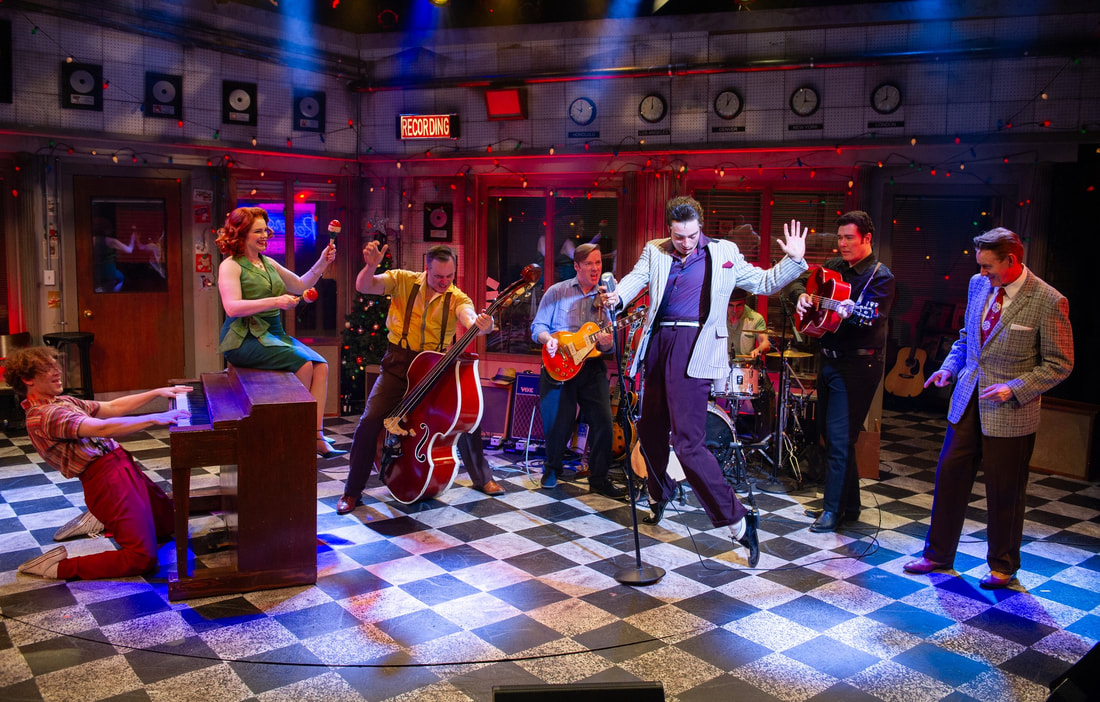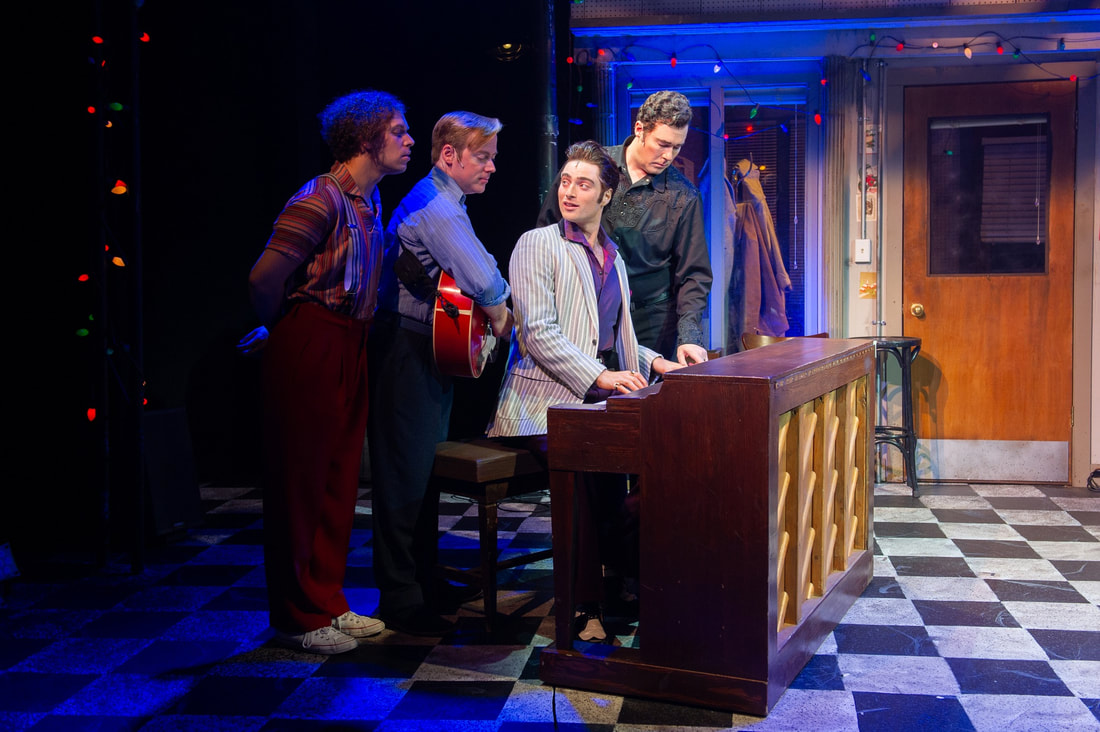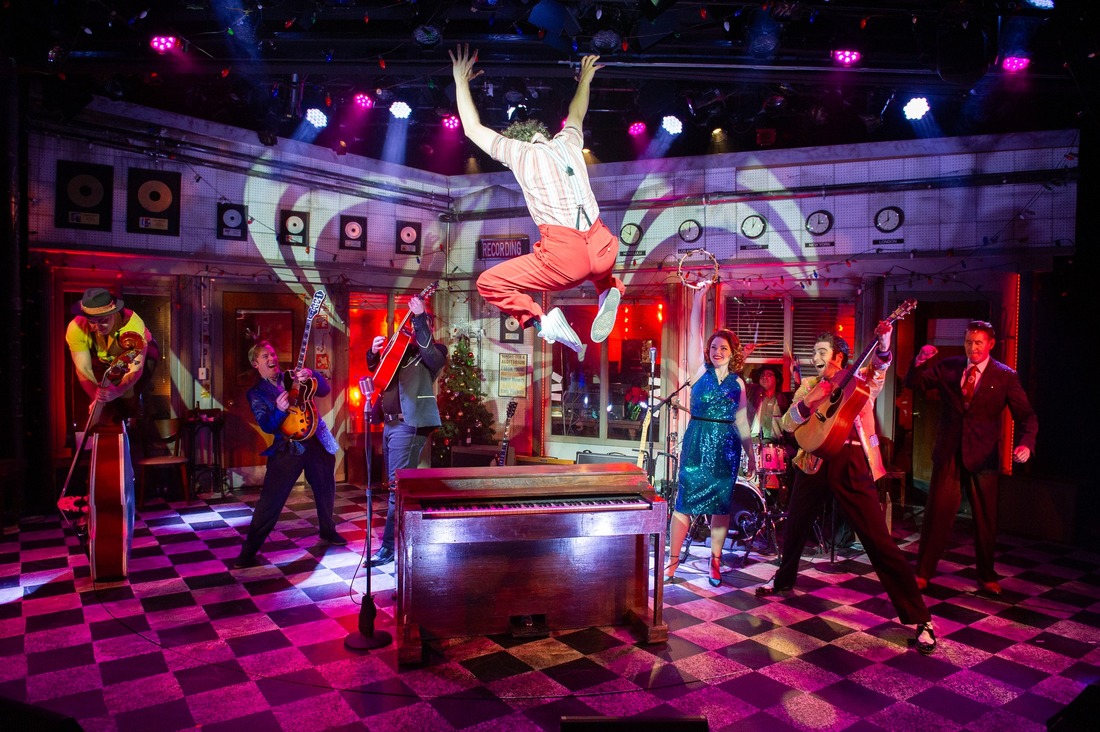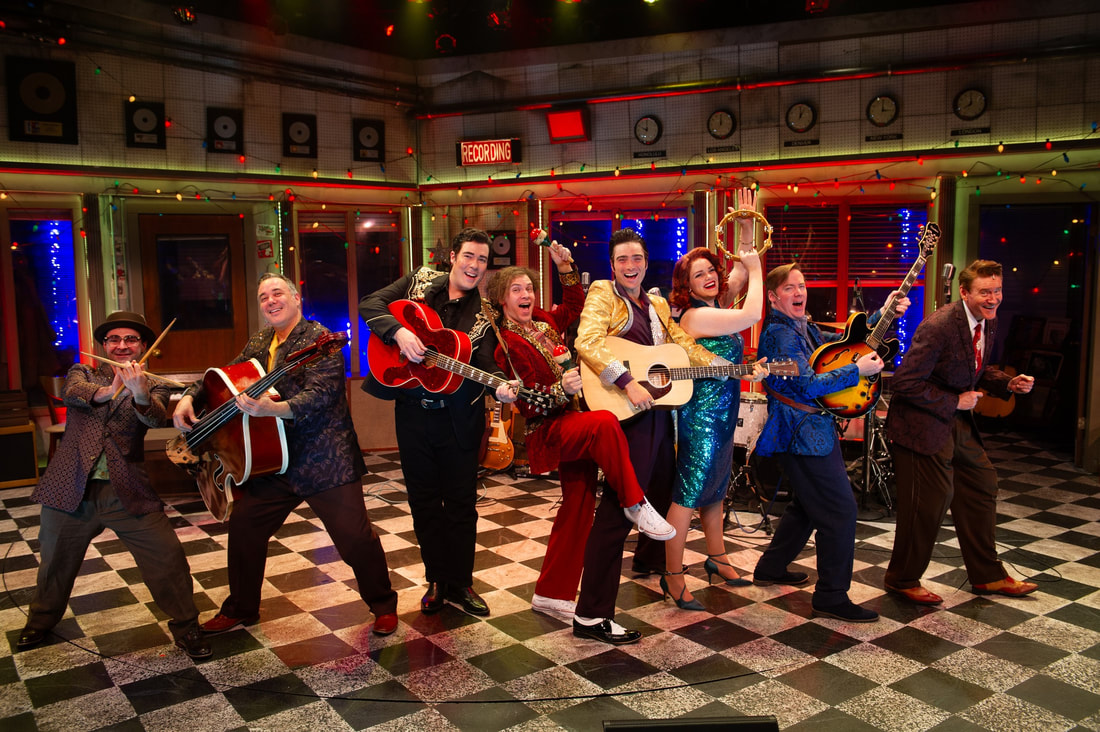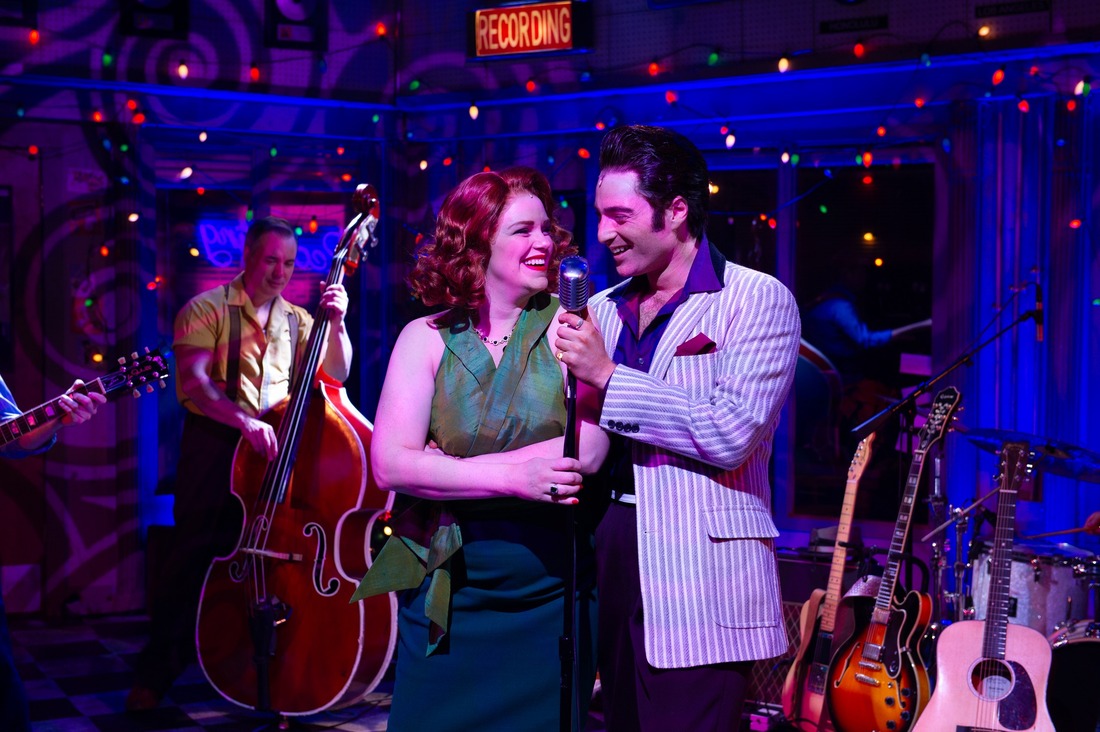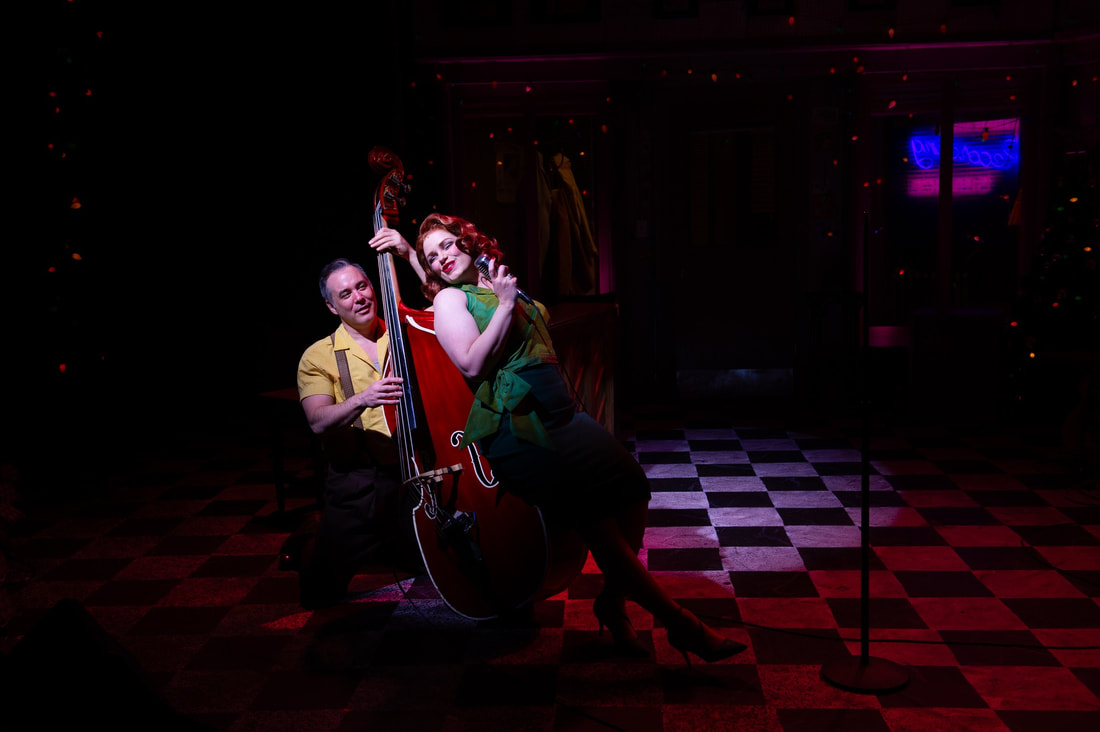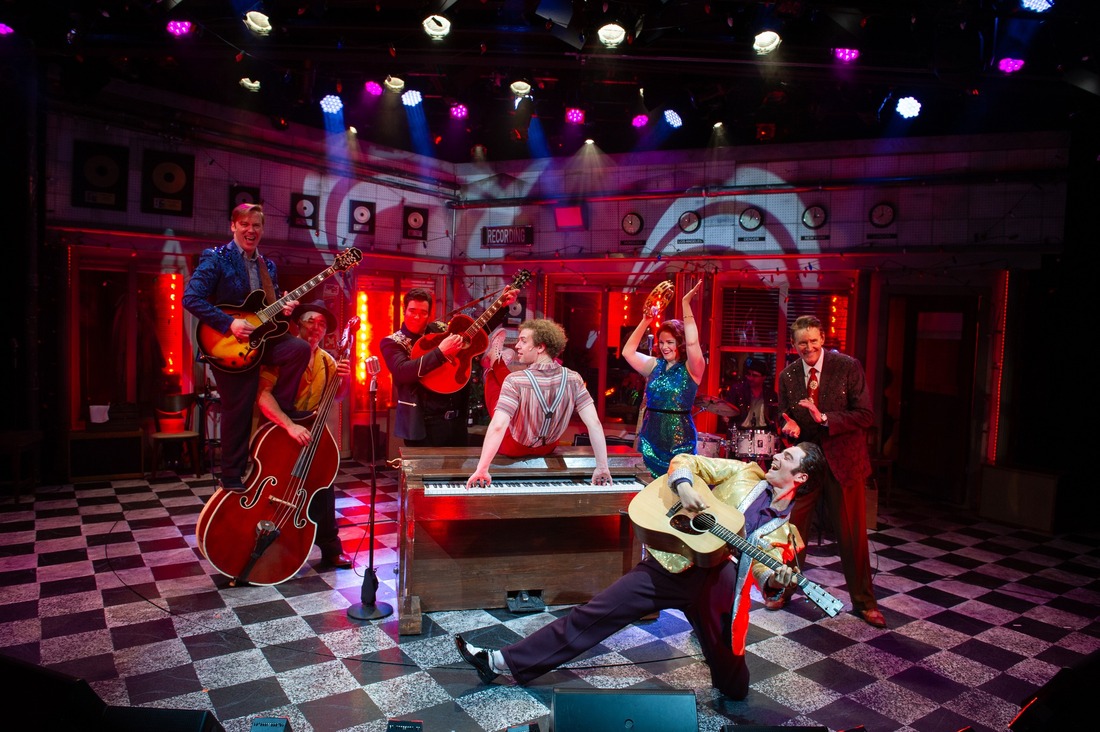ACT of Connecticut's rocking and rolling million dollar quartet tops the charts
By Kiersten Bjork (February 24, 2024)
Million Dollar Quartet at ACT of Connecticut is rocking and rolling right to the top of the charts! Featuring an incredibly talented company, Million Dollar Quartet combines iconic tunes with electric performances into a fun, lively evening of theatre.
Million Dollar Quartet has a book by Colin Escott and Floyd Mutrux, with original concept and direction by Floyd Mutrux, and is inspired by Elvis Presley, Johnny Cash, Jerry Lee Lewis, and Carl Perkins. The production is directed by Hunter Foster, with music direction by Nat Zegree. Foster’s take is a recipe for success – dynamic choices, explosive energy, scenes that reach a fever pitch both in terms of volume and tension – all supported by the slate of classic songs and top-notch performers. Million Dollar Quartet has the audience singing along and dancing in their seats (and out of them, at times). It’s the most fun I’ve had at a show in a while!
The musical is set on December 4th, 1956: the night that four musical legends converge on Sun Records Studio in Memphis, Tennessee. The careers of Johnny Cash, Jerry Lee Lewis, Carl Perkins, and Elvis Presley had all been launched at Sun Records, with the help of owner Sam Phillips who had discovered and produced them. On this fateful night, these four titans of the industry gather at the place where it all began, and they make music. With zest and a touch of rock and roll magic, Million Dollar Quartet is off and running from the very first song to the final standing ovation – a truly knockout production.
Million Dollar Quartet at ACT of Connecticut is rocking and rolling right to the top of the charts! Featuring an incredibly talented company, Million Dollar Quartet combines iconic tunes with electric performances into a fun, lively evening of theatre.
Million Dollar Quartet has a book by Colin Escott and Floyd Mutrux, with original concept and direction by Floyd Mutrux, and is inspired by Elvis Presley, Johnny Cash, Jerry Lee Lewis, and Carl Perkins. The production is directed by Hunter Foster, with music direction by Nat Zegree. Foster’s take is a recipe for success – dynamic choices, explosive energy, scenes that reach a fever pitch both in terms of volume and tension – all supported by the slate of classic songs and top-notch performers. Million Dollar Quartet has the audience singing along and dancing in their seats (and out of them, at times). It’s the most fun I’ve had at a show in a while!
The musical is set on December 4th, 1956: the night that four musical legends converge on Sun Records Studio in Memphis, Tennessee. The careers of Johnny Cash, Jerry Lee Lewis, Carl Perkins, and Elvis Presley had all been launched at Sun Records, with the help of owner Sam Phillips who had discovered and produced them. On this fateful night, these four titans of the industry gather at the place where it all began, and they make music. With zest and a touch of rock and roll magic, Million Dollar Quartet is off and running from the very first song to the final standing ovation – a truly knockout production.
The standout of the production, by far, is Nat Zegree as Jerry Lee Lewis. Amid a company of skilled musicians and actors, Zegree is even a step above. Practically bursting at the seams with a chaotic energy, Zegree is an absolute firecracker every moment he’s on stage. There is a wild exuberance to his performance, evoking the slightly zany side of Lewis, while also infusing his take with an amusing cockiness and spunk. When this man sits at – lies on, leaps over, dances on – that piano, you better hang onto your hats because he plays faster than any ride you’ve ever been on. It’s a killer performance on all fronts – I’d see the production a second time just to witness his Jerry Lee Lewis again!
Carl Perkins, icon of the rockabilly genre, is played by Christopher Wren. Wren infuses Perkins with a snappy wit, while also maintaining the world-weary feeling that he bears as he tries to find that next big hit. Wren is a skilled guitarist, and he really has the audience hanging on every note. I enjoyed his banter with Zegree’s Lewis, as well as the relationship with Perkins’ brother, “Brother Jay” (Nathan Yates Douglass).
Alessandro Gian Viviano brings a playfulness to the role of the King himself, Elvis Presley. His Presley is suave and charming, possesses great chemistry with love interest Dyanne (Megan Reinking), and strives to live within the voice, accent, and recognizable moves of the singer. All in all, he gives a strong performance, hitting those distinct qualities with Presley flare while still maintaining his own interpretation of that iconic man.
Rounding out the famous quartet is Scott Moreau as Johnny Cash. Dressed to impress and wielding his guitar in classic Cash poses, Moreau still successfully creates a subtler character. Cash doesn’t have that same explosive rock tendency that the other three possess, and Moreau lives within that quite well. He’s got a gorgeous bass-baritone voice that sits nicely in that sweet and grounded Cash sound, and it was clear that he was an audience favorite.
Carl Perkins, icon of the rockabilly genre, is played by Christopher Wren. Wren infuses Perkins with a snappy wit, while also maintaining the world-weary feeling that he bears as he tries to find that next big hit. Wren is a skilled guitarist, and he really has the audience hanging on every note. I enjoyed his banter with Zegree’s Lewis, as well as the relationship with Perkins’ brother, “Brother Jay” (Nathan Yates Douglass).
Alessandro Gian Viviano brings a playfulness to the role of the King himself, Elvis Presley. His Presley is suave and charming, possesses great chemistry with love interest Dyanne (Megan Reinking), and strives to live within the voice, accent, and recognizable moves of the singer. All in all, he gives a strong performance, hitting those distinct qualities with Presley flare while still maintaining his own interpretation of that iconic man.
Rounding out the famous quartet is Scott Moreau as Johnny Cash. Dressed to impress and wielding his guitar in classic Cash poses, Moreau still successfully creates a subtler character. Cash doesn’t have that same explosive rock tendency that the other three possess, and Moreau lives within that quite well. He’s got a gorgeous bass-baritone voice that sits nicely in that sweet and grounded Cash sound, and it was clear that he was an audience favorite.
Producer Sam Phillips serves as the narrator for much of the show, and he is played by Bart Shatto with an endearing charm. He guides us through the story with a level-headedness amidst the energy, making the moments in which he breaks out of that steadiness all the more impactful. Shatto leans into an almost father-like portrayal of Phillips, to much success.
Elvis’ girlfriend and singer in her own right, Dyanne, is played by Megan Reinking. Dyanne is a sultry, sexy character with a pop of pizazz, and Reinking gives a strong performance in the role. There were a few moments when I wanted a little more power from her voice, but the belted notes of “I Hear You Knocking” and the smooth sound of “Fever” were wonderful.
Nathan Yates Douglass is a standout as Carl Perkins’ bass-playing brother, aptly called “Brother Jay.” Like the rest of the company, Douglass is a talented musician, and he has the opportunity to wow the crowd with some out-of-the-box bass tricks that you don’t see every day. From playing the bass while lying on it, standing on it, or holding it like a guitar, there isn’t a dull moment when Douglass steps forward with that upright.
Rounding out the musicians is Matt Spencer as Fluke, the drummer. While he’s tucked upstage for much of the show, that doesn’t diminish the impressive caliber of the drum solos sprinkled throughout production. Spencer keeps each tune on track with his skillful handling of the percussion section.
Across the board, I commend ACT of Connecticut and their team for the cast that has been assembled for this production – they’re all a joy to watch, and the combined sound and spirit of this company is incredibly entertaining.
Elvis’ girlfriend and singer in her own right, Dyanne, is played by Megan Reinking. Dyanne is a sultry, sexy character with a pop of pizazz, and Reinking gives a strong performance in the role. There were a few moments when I wanted a little more power from her voice, but the belted notes of “I Hear You Knocking” and the smooth sound of “Fever” were wonderful.
Nathan Yates Douglass is a standout as Carl Perkins’ bass-playing brother, aptly called “Brother Jay.” Like the rest of the company, Douglass is a talented musician, and he has the opportunity to wow the crowd with some out-of-the-box bass tricks that you don’t see every day. From playing the bass while lying on it, standing on it, or holding it like a guitar, there isn’t a dull moment when Douglass steps forward with that upright.
Rounding out the musicians is Matt Spencer as Fluke, the drummer. While he’s tucked upstage for much of the show, that doesn’t diminish the impressive caliber of the drum solos sprinkled throughout production. Spencer keeps each tune on track with his skillful handling of the percussion section.
Across the board, I commend ACT of Connecticut and their team for the cast that has been assembled for this production – they’re all a joy to watch, and the combined sound and spirit of this company is incredibly entertaining.
Scenic design by Josh Smith brings you right into the story from the moment you enter the house to take your seat. The plot unfolds within the studio space at Sun Records, and Smith has created an almost whimsical version of this worn, well-loved studio. A variety of guitars and other instruments litter the stage in addition to amps and microphones. Gold and silver records line the walls, and it’s all framed by an array of soft, colorful Christmas lights that come to life at different moments. A large neon “SUN” sign hangs above stage right and is used to add some neat touches to scenes as well.
Lighting designer Kirk Bookman creates an effective lighting look for the studio, peppering in colorful rock lighting that gives those electric scenes a great boost. There did seem to be a slight issue with the follow-spot tracking of Shatto as Phillips in the first act, and there were times that he ended up in the dark for longer than was ideal, but everything seemed to have caught up by Act II.
Costumes and wigs by designer Lauren T. Roark are well-suited to the respective characters. The pop of red for Jerry Lee Lewis fits his chaotic nature, while the slightly more sobering black of Johnny Cash supports the groundedness he brings to the quartet. I particularly enjoyed the fun additions to the company costumes for the final number!
I want to particularly commend sound designer Jeff Sherwood, as well as the sound and audio team consisting of Audrey Loewen, Jacob Sanner, Davie Voelker, Matthew Gandelman, and Emerson Wachnik. Rock shows like this are notoriously hard to mix. When you mix live vocals, piano, multiple guitars, bass, and percussion in an intimate theatre setting, it can be almost impossible to reach that ideal sound where the audience isn’t overwhelmed by the volume while still getting that powerful sound, and making sure that instruments and voices are balanced so you can hear everything clearly. I could not have been happier with the mix of this show! Vocals were clear, all instruments and voices were well balanced, and there wasn’t a single moment of problematic feedback – kudos to all!
Lighting designer Kirk Bookman creates an effective lighting look for the studio, peppering in colorful rock lighting that gives those electric scenes a great boost. There did seem to be a slight issue with the follow-spot tracking of Shatto as Phillips in the first act, and there were times that he ended up in the dark for longer than was ideal, but everything seemed to have caught up by Act II.
Costumes and wigs by designer Lauren T. Roark are well-suited to the respective characters. The pop of red for Jerry Lee Lewis fits his chaotic nature, while the slightly more sobering black of Johnny Cash supports the groundedness he brings to the quartet. I particularly enjoyed the fun additions to the company costumes for the final number!
I want to particularly commend sound designer Jeff Sherwood, as well as the sound and audio team consisting of Audrey Loewen, Jacob Sanner, Davie Voelker, Matthew Gandelman, and Emerson Wachnik. Rock shows like this are notoriously hard to mix. When you mix live vocals, piano, multiple guitars, bass, and percussion in an intimate theatre setting, it can be almost impossible to reach that ideal sound where the audience isn’t overwhelmed by the volume while still getting that powerful sound, and making sure that instruments and voices are balanced so you can hear everything clearly. I could not have been happier with the mix of this show! Vocals were clear, all instruments and voices were well balanced, and there wasn’t a single moment of problematic feedback – kudos to all!
Million Dollar Quartet at ACT of Connecticut is exactly what I wanted from a show about such iconic names from the music industry. With knockout performances, strong designs, and dynamic direction, you won’t want to miss this production – and you’re in luck! Due to popular demand, the run has been extended. Catch Million Dollar Quartet at ACT of Connecticut before it closes, now on March 23!
Million Dollar Quartet runs February 21-March 23 at ACT of Connecticut in Ridgefield, CT. Tickets are available online at ACTofCT.org or by calling (475) 215-5497.
Kiersten Bjork is a theatremaker, performer, and reviewer (Connecticut Critics Circle) from Branford, CT.
Million Dollar Quartet runs February 21-March 23 at ACT of Connecticut in Ridgefield, CT. Tickets are available online at ACTofCT.org or by calling (475) 215-5497.
Kiersten Bjork is a theatremaker, performer, and reviewer (Connecticut Critics Circle) from Branford, CT.
